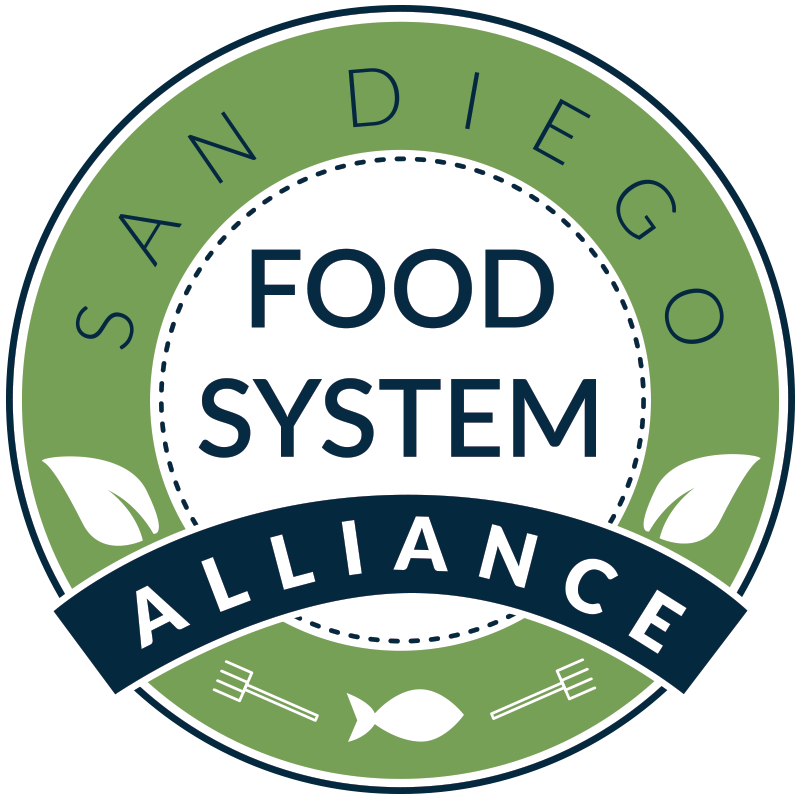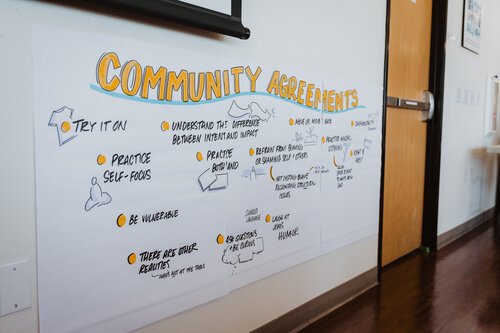2020 | Our Year in Review
As we reflect on this year, we are filled with gratitude, purpose, and pride in our community. Amid a global pandemic, racial reckoning, and economic crisis, our community never wavered. Farmers, fishermen, and every worker along the food chain adapted and persevered to keep us healthy and nourished. Healthcare workers battled the pandemic daily. Poll workers and mail carriers showed up for our democracy. Residents took to the streets, the polls, their workplaces and dinner tables to imagine a more just and resilient world. As a result, this year of crisis has become a year of transition.
Within the San Diego Food System Alliance, a shift is underway as well.
We are on the cusp of publishing San Diego County Food Vision 2030, and unveiling this 10-year roadmap to transform our region’s food system. Over the past year, thousands of San Diegans—residents, food system workers and experts, community leaders—have joined us, speaking up and contributing in one way or another to building this shared Vision for food in our communities.
On behalf of the Alliance, thank you all for your support this year.
Whether you donated, signed up for our newsletter, shared your perspective, lent us your advice, liked our posts, or took the time to learn about the food system, thank you. Your presence is powerful.
We are thrilled to share some highlights from the Alliance this year.
While we face a complex new year ahead, we want to take this moment to reflect upon and celebrate these wins of 2020. With the growing support of our community, cultivating a healthy, sustainable, and just food system has never felt more possible.
We hope that you and your loved ones are safe and well, and wish you a joyous holiday season and a happy new year.
With gratitude,
Elly Brown, Executive Director
Sona Desai, Associate Director
San Diego Food System Alliance
2020 Highlights
We advanced a collective effort to reduce food waste across the County at all levels.
Our Wasted Food Prevention Program provides comprehensive and specialized services to government agencies, institutions, businesses, nonprofits and residents as they take steps to reduce food waste.
-
In its pilot year, the Alliance's Smart Kitchens San Diego program enabled 15 major San Diego County institutions to divert 335,000 pounds of food from going to waste by making changes in their kitchen operations and partnering with local food recovery organizations.
-
Our Wasted Food Prevention Program is now consulting for four cities across San Diego County on reducing their food waste, by providing consumer education and technical assistance. In 2020, we completed our first city contract with the City of Escondido, and secured new contracts with the cities of Oceanside, Carlsbad, and the County of San Diego.
-
Our EcoChallenge program recruited 900 participants at six of San Diego's largest employers and institutions to take part in fun and competitive food waste tracking challenges at home. Over 15 months, participants reported a 38% reduction in food waste and learned about topics like the social and environmental impacts of wasting food, and the importance of a local, sustainable food system.
We empowered institutions to use their purchasing power to support a local, equitable, and sustainable food system.
The Alliance facilitates the Good Food Purchasing Program (GFPP) Working Group, a coalition that supports regional implementation of GFPP, a program that encourages institutions to direct their buying power toward uplifting local economies, environmental sustainability, valued workforce, animal welfare, and nutrition.
-
This year, with the support of our Good Food Purchasing Program working group, Escondido Union School District (EUSD) and Oceanside Unified School District (OUSD) became the first institutions in San Diego County to adopt GFPP, a commitment that encourages them to purchase food that meets robust labor, health, animal welfare and sustainability standards while prioritizing local food sources.
EUSD and OUSD could collectively direct nearly $7.3 million toward healthier, more equitable and sustainable vendors and improve healthy food access for all students. GFPP implementation at EUSD and OUSD will impact more than 38,000 low income students who depend on school meals for daily nutrition.
Our community came together to offer relief and support for those hit hardest by COVID-19.
The public health and economic crisis caused by COVID-19 is dramatically impacting our food system, exposing inequalities and the need for greater resilience. The Alliance is committed to the recovery of San Diego County’s food system, and to building a stronger, more resilient, and more equitable system—one that will better prepare us for the future.
-
The Alliance published a COVID-19 Response & Resources page on our website, hoping to provide some immediate support to our community by compiling resources, opportunities for relief, news updates, education, and ways to help across the food system.
-
It quickly became clear that political action and financing were (and still are) urgently needed to support those most impacted by COVID-19. The Alliance published a COVID-19 issue brief recommending policy and funding priorities, with impacts, statistics, and short stories to shine a light on pandemic’s impacts on workers’ and residents’ daily lives in our communities.
Our organization grew in many ways.
The Alliance is a diverse and inclusive network that works across sectors to promote collaboration, influence policy, and catalyze transformation in the food system. Not only have our staff and network grown in number each year, we have reached a few important and meaningful milestones in 2020.
-
The Alliance wrote our Statement on Justice this year, after beginning a process of exploring justice, equity, diversity, and inclusion with The Justice Collective in 2019.
It reads, “Our only path toward healing ourselves and our food system is through a deep commitment to social, environmental, and economic justice for all." It continues, “We choose to lead with race and focus on achieving racial justice to ensure that the needs and experiences of people of color are prioritized. In our vision, Black, Indigenous, and people of color lead efforts to imagine and plan for their food system. Their stories, traditions, and knowledge are centered and are heard. They reclaim their health, land, and power.”
This statement highlights our commitment, approach, and values as we seek to build a more equitable food system in San Diego County. Centering justice, equity, diversity, and inclusion in our organization has never been more important.
-
The Alliance officially transitioned from a fiscally sponsored organization of Leah’s Pantry to an independent 501(c)3 nonprofit organization in September. We are grateful to Adrienne and the leadership at Leah’s Pantry for supporting us all of these years, and are excited to be moving forward into this next phase of growth for the Alliance!
With an amazing community of partners and supporters, we completed the first two phases of San Diego County Food Vision 2030.
We are nearing the end of the 18-month process to develop San Diego County Food Vision 2030, a 10-year plan and movement to cultivate a healthier, more sustainable, and more just food system throughout our region.
-
Food Vision 2030 is deeply rooted in research, and the needs and aspirations for our food system as expressed by our community. Our team conducted hundreds of hours of interviews and discussions with our region’s food system leaders, and examined vast recent and historical data, to identify trends and areas of opportunity for each component of our food system.
-
Amidst the changes brought on by COVID-19, the Alliance pivoted from planning an in-person community engagement process to an inclusive, digital one. Engagement took place on a multilingual online platform, yielding over 2,700 responses. Nearly 60% of contributions came from residents of marginalized neighborhoods and food system workers.
The Alliance is committed to developing a regional plan that engages the full community, including people who produce, prepare, distribute, serve, and eat food—particularly those most affected by current inequities in the food system.
-
The goal of Food Vision 2030 is to inform planning, policy, program, and investment opportunities that will transform our region's food system over the next ten years. We are excited to share the draft Goals, Objectives, and Strategies that underpin this shared vision.
We are deeply grateful to our network, community partners, essential food workers, residents, and leaders who have all amplified and shaped Food Vision 2030 this year. Thank you!
Our work is not possible without the continued generosity of our community. Thank you to our funders and supporters.
Grants
Belo Family Fund of the Jewish Community Foundation
David C. Copley Foundation
Dr. Bronner’s Family Foundation
Food 4 Less/Ralphs/Kroger Foundation
Kasperick Foundation
Leichtag Foundation
Mighty Arrow Family Foundation
Moxie Foundation
Nordson Corporation Foundation
Patagonia
Price Philanthropies Foundation
SDG&E Environmental Champions
The San Diego Foundation - Anonymous Donor Fund, The Hattie Ettinger Conservation Fund, Hervey Family Fund
Corporate Sponsors
Aetna Better Health of California
Alexandria Real Estate Equities, Inc
Genentech
SDG&E
World Centric
Visionary Circle
Carol Hidalgo
Day Family Foundation
Katie Stokes
Mary Abad
Robin Pruitt
Selby and Richard Winkler Charitable Fund
Jessica Joelson
And finally, we extend our gratitude to many other individuals and our Leadership Council members for their generous and continuing support.





